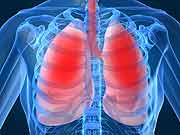After six months of treatment, worse control in children with poor CYP2C19 metabolizer phenotype
WEDNESDAY, April 15, 2015 (HealthDay News) — Children with poor metabolizer phenotype based on CYP2C19 have worse asthma control after six months of lansoprazole treatment, according to a study published online April 6 in the Annals of the American Thoracic Society.
Jason E. Lang, M.D., M.P.H., from Nemours Children’s Hospital in Orlando, Fla., and colleagues examined how metabolizer phenotype, based on genetic analysis of CYP2C19, affects asthma control. The Asthma Control Questionnaire was used to assess asthma control for a six-month clinical trial of lansoprazole in children with asthma. Participants were classified as placebo-treated; lansoprazole-treated extensive metabolizers (EM; carriers of two wild-type CYP2C19 alleles); and lansoprazole-treated poor metabolizers (PM; carriers of CYP2C19*2, *3, *8, *9, or *10 alleles).
The researchers found that through most of the treatment period, asthma control was unaffected by lansoprazole exposure or metabolizer phenotype. PMs exhibited significantly worse asthma control at six months compared with EMs and placebo-treated children (+0.16 versus −0.13 and −0.23, respectively; P = 0.02 and P < 0.01, respectively). There was no association between differences in asthma control and changes in gastroesophageal reflux systems. Recent upper respiratory infection correlated with worse asthma control, and this effect was more pronounced among lansoprazole-treated PMs.
“Children with the poor metabolizer phenotype developed worse asthma control after six months of lansoprazole treatment for poorly controlled asthma,” the authors write.
The study was partially funded by Takeda Pharmaceuticals and GlaxoSmithKline.
Full Text (subscription or payment may be required)
Copyright © 2015 HealthDay. All rights reserved.








